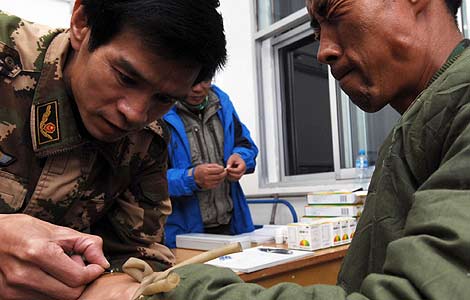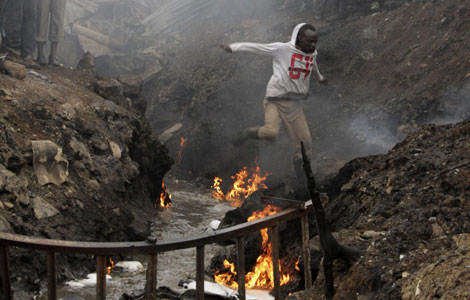Libya-style intervention unlikely in Syria
Updated: 2011-09-13 10:53
(Xinhua)
|
|||||||||||
DAMASCUS - Despite the mounting international pressure and non-stop sanctions hitting Syria over the government's alleged crackdown on protesters, many Syrian observers and academics rule out the possibility that foreign intervention like the NATO-led operation in Libya will take place in Syria.
This is partly because foreign intervention will be absolutely rejected by almost all the Syrians, including the opposition.
 |
It is also due to Syria's strategic relations with its regional allies such as Iran and Lebanon's Hezbollah, as well as powerful countries like Russia, which opposed tough measures by the United Nations Security Council against the Syrian leadership, the analysts said.
Fayez al-Sayegh, a political analyst and former director general of the Syrian official radio and television, told Xinhua by phone that "the Libyan scenario is not acceptable anymore by the international community," adding that "the Arab League backed the NATO operations in Libya but not in Syria."
The Arab League (AL) chief Nabil El-Arabi voiced Saturday AL's keenness about Syria's security and stability and its rejection of all kinds of foreign intervention in Syria's internal affairs.
During a meeting held in Damascus with Syrian President Bashar al-Assad, El-Arabi said the AL is desirous to help Syria to bypass the current crisis, stressing that the AL would never be a "passage for undertaking any anti-Arab country decision."
Al-Sayegh criticized the NATO operation in Libya, saying that "NATO, which entered Libya to protect the civilians, didn't succeed in its mission, but rather entered a political game and has become a party of the conflict with the Libyans."
Many countries, such as Russia, opposed the military operation in Libya, he said, suggesting that many countries will also oppose the intervention in Syria.
Russia does not want to see a repetition of the Libyan scenario in Syria and will send a delegation of senators to Syria "in the nearest future" for mediation over its current crisis, Mikhail Margelov, head of the Russian Federation Council Committee on International Affairs, said Monday.
Russian President Dmitry Medvedev said the West-led operation in Libya has gone beyond the UN mandate and Moscow does not want a repeat of such a scenario in Syria.
"The situation in Libya has changed," Medvedev told Euronews in an interview broadcast Friday, adding that Russia definitely did not "want the same thing to happen in Syria."
Taleb Ibrahim, another political analyst, told Xinhua that "there are many reasons why the Libyan scenario can't be repeated in Syria, mainly the refusal by most Syrians of a similar intervention, and the coherence of security and army personnel, a matter that can thwart any military plans against Syria."
The Syrian army has, up till now, massive strategic potentials despite "some limited individual desertions from the army service," Ibrahim said, pointing out that neither the opposition nor the " armed terrorist groups" would impose their control over a certain area in Syria as it happened in the Libyan city of Benghazi.
He warned that foreign intervention would have dangerous repercussions. "An international intervention would drag the Lebanese Hezbollah and neighboring Iran to the battle field, so the situation would become hard to control in the region," he said.
Faruq Hajji, a Syrian journalist and political observer, also counted on the "Syrian people' awareness to fend off such idea" of foreign intervention, saying that the Syrian opposition is currently bypassing many of the government's shortcomings and trying to create a national stance aside of any foreign agendas.
Hajji said the Arab initiative represents the best solution to the months-long crisis in Syria.
The Arab initiative calls on the Syrian government to immediately stop all violence against civilians, withdraw all military forces from towns, and stop the bloodshed so that Syria would not be driven toward sectarian strife or give justification for foreign intervention.
Syria dismissed the initiative as an interference in its internal affairs.
Syria has been in unrest since mid-March when anti-government protests broke out in the southern province of Daraa and spread to other cities.
Activists and human rights groups said more than 2,200 civilians have been killed in the alleged government operation against the protest movement.
The Syrian government disputes the toll, blaming the five-month- long unrest on armed groups backed by foreign conspiracy with the aim of unseating al-Assad and vowed to track down gunmen who have intimidated the people and damaged public and private properties.
Hot Topics
Libya conflict, Gaddafi, Oil spill, Palace Museum scandal, Inflation, Japan's new PM, Trapped miners, Mooncake tax, Weekly photos, Hurricane Irene
Editor's Picks

|

|

|

|

|

|







